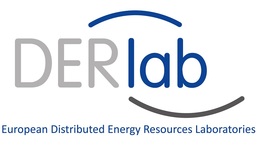There currently are no upcoming events planned.
Come back soon to check for new events or subscribe to our newsletter!
HyLeiT
The joint project HyLeiT is part of the BMBF flagship project H2Giga, which deals with the series production and scale-up of water electrolysers. Within H2Giga, HyLeiT covers the interdisciplinary topic “electrical hydrogen system technology”. Central research topics are cost-optimized system and power converter technology as well as the grid integration of electrolysis plants for the production of green hydrogen. The BMBF project HyLeiT is coordinated by the Fraunhofer Institute for Energy Economics and Energy System Technology IEE in Kassel.
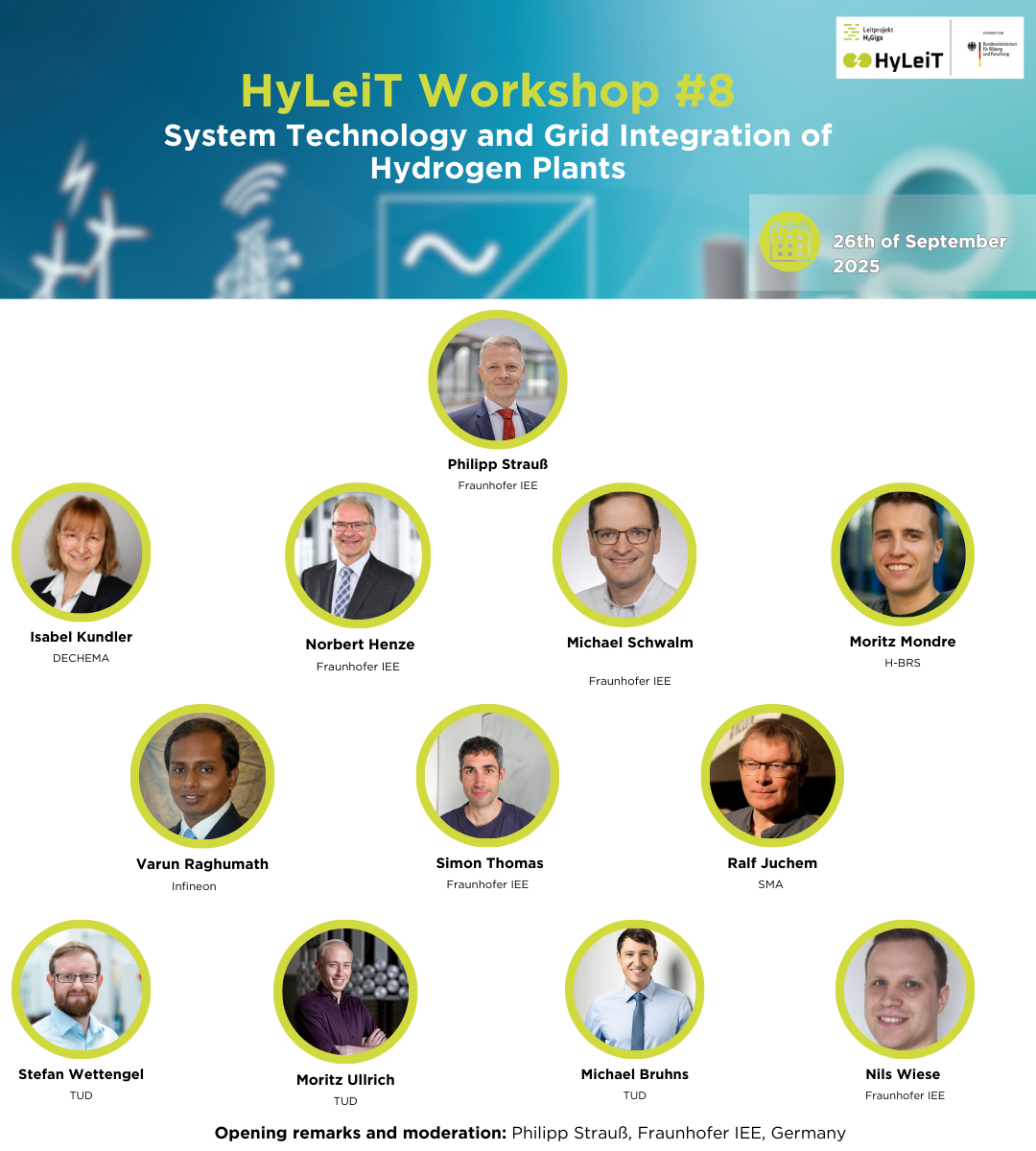
Date: 26.09.2025 9:00 – 12:30
Topic: System Technology and Grid Integration of Hydrogen Plants
The joint project HyLeiT is part of the H2Giga flagship project, which is funded by the BMFTR and deals with the industrialization and scaling up of water electrolysis. Within H2Giga, HyLeiT deals with the interdisciplinary topic of “electrical hydrogen system technology.” The HyLeiT consortium consists of Fraunhofer IEE, SMA Solar Technology AG, the Technical University of Dresden, the Hochschule Bonn-Rhein-Sieg and Infineon Technologies AG. The consortium focuses on the power supply and grid integration of electrolyzers.
The project began in April 2021 and will conclude in September 2025. A public workshop will be organized at the end of the project to present the work carried out and the results achieved. HyLeiT focuses on the electrical system technology of electrolysis plants, particularly the converter technology between the grid and the electrolyzer. The goal is to reduce costs of power electronics and improve the reliability and grid compatibility of electrolysis plants. To this end, the partners are developing a specially adapted, optimized converter technology that uses application-specific, optimized silicon carbide (SiC) power semiconductors.
To test and optimize the converters in a system context, simulation models that can operate in real time are being created for the power grid and the electrolysis stacks. These models contribute to a “Power-Hardware-in-the-Loop (P-HIL)” platform that enables testing of the developed converter concepts under various grid conditions and stack configurations. Additionally, real-time electrochemical models of electrolysis cells can accurately simulate their performance and aging characteristics of the cells under different operating conditions.
Furthermore, the electrical connection technology in electrolysis rectifiers is being optimized to enhance efficiency and reliability. Particular attention is given to thermal design as well as to investigations of the contact characteristics and long-term behavior of the connection elements. These developments are accompanied by an investigation of novel protection concepts for electrical system technology. To increase the system’s robustness, faults must be reliably detected and resolved autonomously.
At the workshop, the HyLeiT consortium will present the project results along the entire chain from the grid to the rectifier and up to the electrolysis stack.
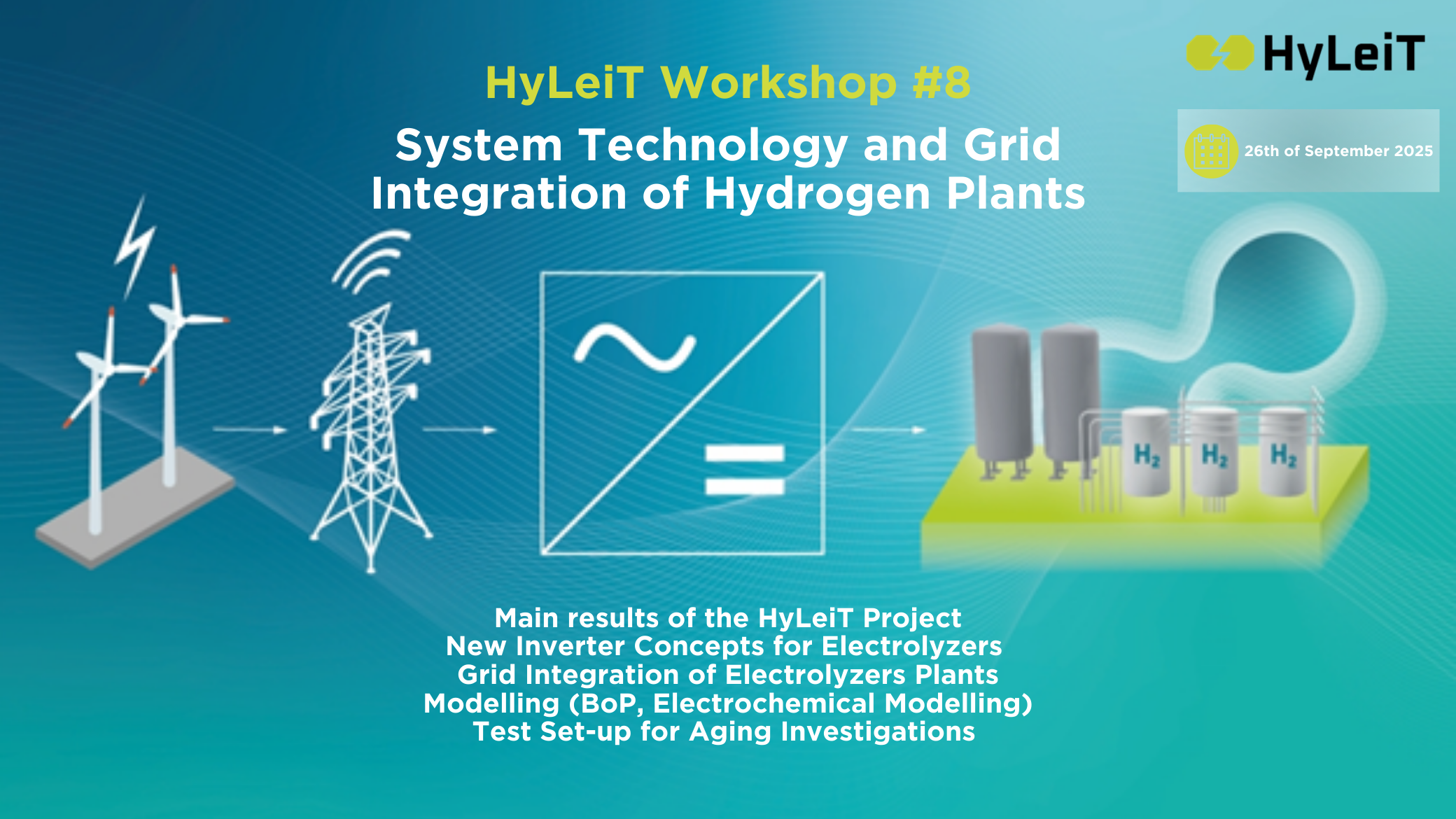
Find the presentations below:
The Role of HyLeiT in H2Giga – Isabel Kundler, DECHEMA, Germany
The HyLeiT Project: Objective and Results – Norbert Henze, Fraunhofer IEE, Germany
Challenges in the Power Supply of Electrolysis Plants: A review of DERlab Workshops – Norbert Henze, Fraunhofer IEE, Germany
Electro-Chemical Cell and Stack Models – Michael Schwalm, Fraunhofer IEE, Germany
Test Setup for Aging Investigations on PEM Cells – Moritz Mondre, H-BRS Germany
Optimized Semiconductor Power Modules for Electrolyzer System Applications – Varun Raghunath, Infineon, Germany
Innovative Inverter for Grid Servicing Electrolyzers (follows as soon as received) – Simon Thomas, Fraunhofer IEE, Germany
New Inverter Technologies for Large Electrolyzer Systems – Ralf Juchem, SMA, Germany & Stefan Wettengel, TUD, Germany
Aspects of Reliability of Electrolyser Systems – Moritz Ullrich and Michal Bruhns, TUD, Germany
Grid Integration of Electrolyzers – Nils Wiese, Fraunhofer IEE, Germany
HyLeiT
The joint project HyLeiT is part of the BMBF flagship project H2Giga, which deals with the series production and scale-up of water electrolysers. Within H2Giga, HyLeiT covers the interdisciplinary topic “electrical hydrogen system technology”. Central research topics are cost-optimized system and power converter technology as well as the grid integration of electrolysis plants for the production of green hydrogen. The BMBF project HyLeiT is coordinated by the Fraunhofer Institute for Energy Economics and Energy System Technology IEE in Kassel.
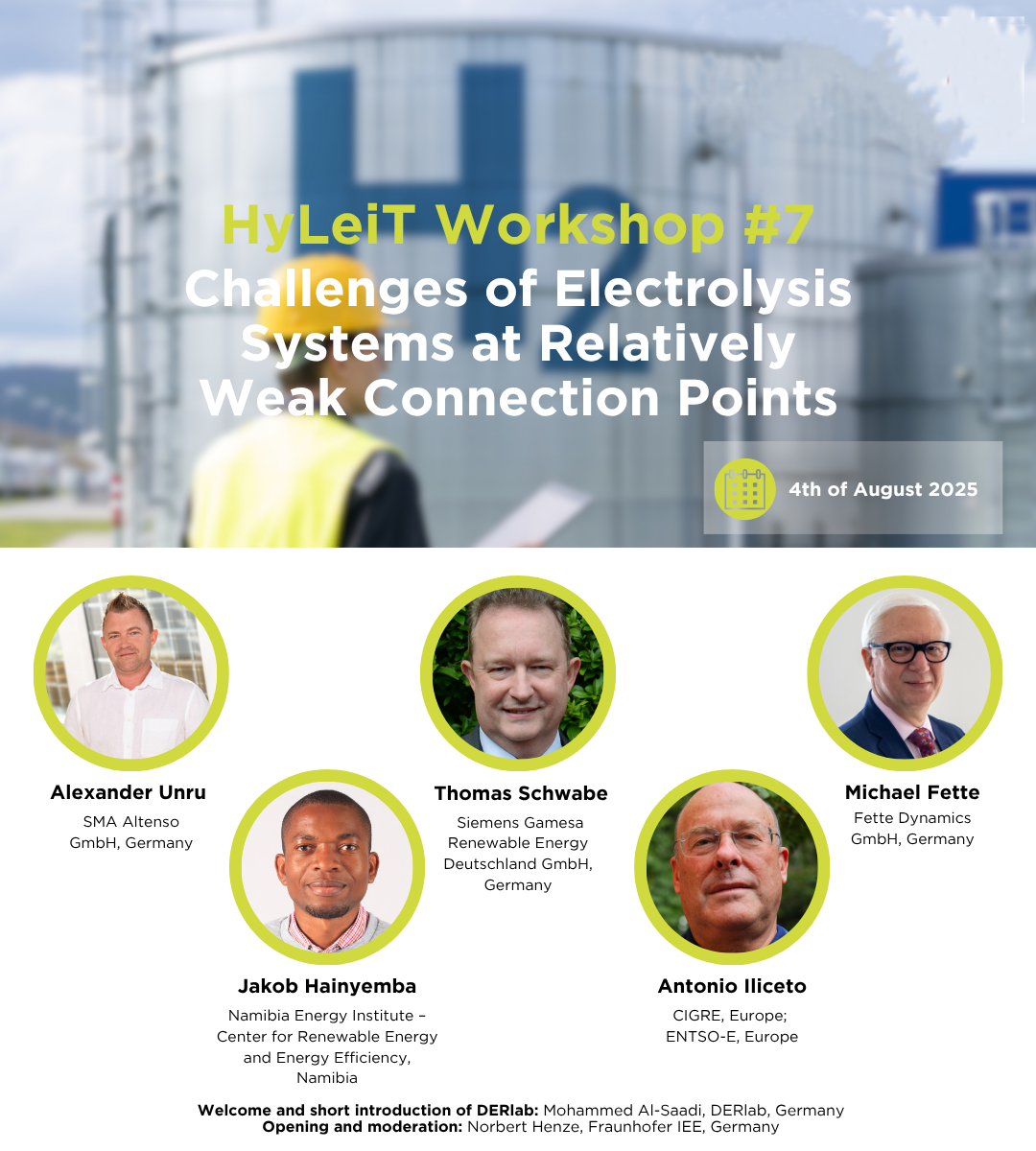
Date: 04.08.2025 13:00 – 15:30
Topic: Challenges of Electrolysis Systems at Relatively Weak Connection Points
Find the presentations below:
Introduction from the Organizer – Dr.-Ing. Mohammed Alsaadi, DERlab e.V., Germany
Workshop Opening – Dr. Norbert Henze, Fraunhofer IEE, Germany
Flagship Project H2 Mare – Thomas Schwabe, Siemens Gamesa Renewable Energy Deutschland GmbH, Germany
Green Hydrogen Electrolysers in Forming Future Grids – Power Electronics Perspective – Michael Fette, Fette Dynamics GmbH, Germany
Hydrogen Integration and its Implications for Weak Grid Infrastructure (cancelled due to illness) – Jakob Hainyemba, Namibia Energy Institute, Namibia
Grid Friendly Hydrogen – Alexander Unru, SMA Altenso GmbH, Germany
Impact of Renewable Hydrogen on the Power System: Sector Development, Flexibility and Market Aspects – Antonio Iliceto, CIGRE & ENTSO-E, Europe
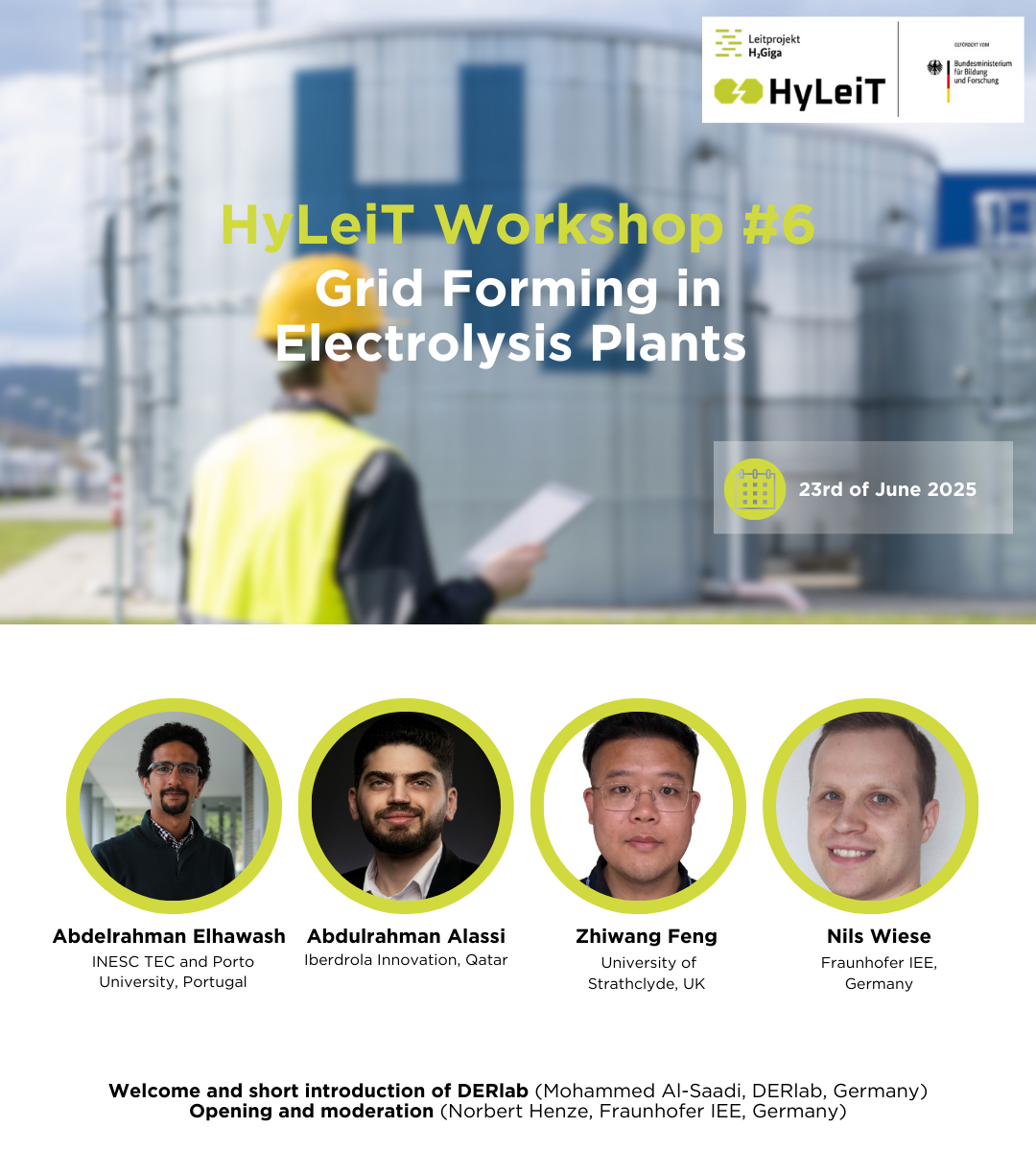
Date: 23.06.2025 13:00 – 15:30
Topic: Grid Forming in Electrolysis Plants
Find the workshop presentations below:
Introduction from the Organizer – Dr.-Ing. Mohammed Alsaadi, DERlab e.V., Germany
Inertia from electrolyzers in transmission systems – Nils Wiese, Fraunhofer IEE, Germany
Grid-forming for Network Resilience: A System Restoration Case Study – Abdulraham Alassi, Iberdrola Innovation, Qatar, and Zhiwang Feng, University of Strathclyde, UK
Green Hydrogen electrolyzers in forming future grids – power electronics perspective – Abdelrahman Elhawash, INESC TEC and Porto University, Portugal
Grid-Forming Technology: Supporting the Transition to Resilient Power Grids – Abdulrahman Alassi, Iberdrola Innovation, Qatar
Date: 14.11.2024
Topic: “Modeling of Electrolysis Plants on Component and System Level”
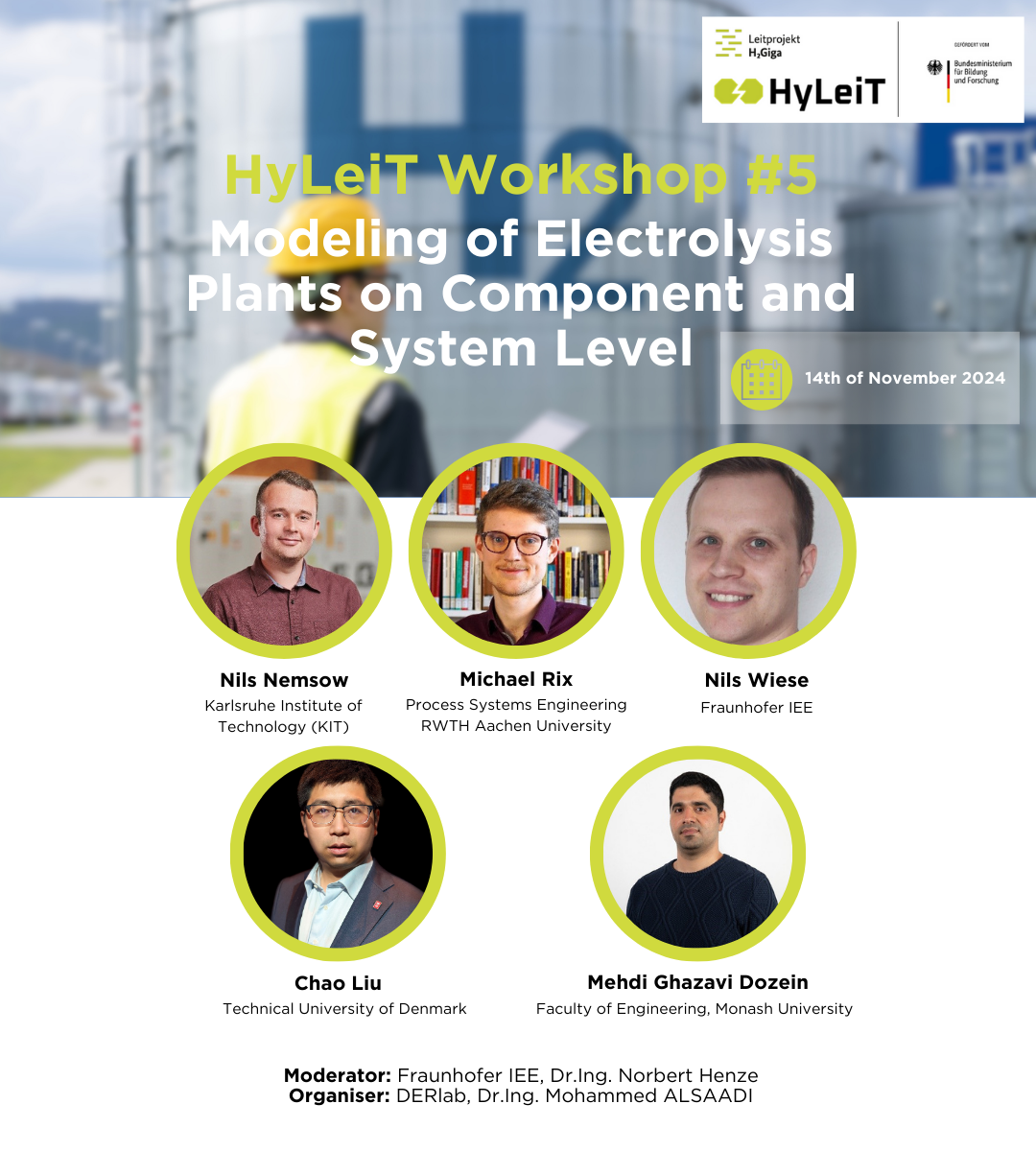
Find the workshop presentations below:
Introduction from the Organizer – Dr.-Ing. Mohammed Alsaadi, DERlab, Germany
Workshop Introduction – Dr.-Ing. Norbert Henzen, Fraunhofer IEE (HyLeiT project coordination), Germany
System Support Services from Hydrogen Electrolysis Plants: Fundamentals and Modelling – Dr. Mehdi Ghazavi Dozein, Monash University, Australia
Grid Integration of Electrolyzers in the Power System – Nils Wiese, Fraunhofer IEE, Germany
H2-in-the-Loop: System level modeling of hydrogen energy storage plants – Nils Nemsow, KIT, Germany
Grid Code Compliance of Elecrolysis Systems: LVRT and PFAPR – Dr. Chao Liu, DTU, Denmark
Dynamic Modeling of Electrolyzers using the eCherry Library – Michael Rix, RWTH Aachen, Germany
Topic: “Grid connection requirements for electrolyser”
Find the workshop presentations below:
Workshop Introduction – Norbert Henze, Fraunhofer IEE (HyLeiT project coordination), Germany
Grid connection requirements in France – Julien Callec, RTE, France
Austria’s H2 Future: Strategy, Legal Framework, and Electrolyser Projects – Carolin Monsberger and Stefan Reuter, AIT, Austria
Minimum technical requirements for the grid connection of electrolysers for 4 German TSOs – Daniel Stenzel, TenneT
Electrolysis grid code requirements – challenges and implications – Sven Schumann, Siemens Energy
Topic: Experts/speakers round, future workshop preparation
Topic: “Modeling of electrolysis plant son component system level”
Workshop Invitation and Introduction
Find the workshop presentations below:
“Dynamic electrical models for power system integration” Nils Wiese, Fraunhofer IEE
“Modeling of electrolysis plants on component and system level” Norbert Henze, Fraunhofer IEE
“Balance of plant (bop) modelling for PEM electrolyzer” Phillip Kretschmer, Fraunhofer IEE
“Quasi-2D Model of a PEM Electrolyser for Assessment of Dynamic Thermal Behavior” Ansgar Reimann, Fraunhofer IEG
“Modelling the electrical energy supply of electrolysis plant under fault conditions” Michael Bruhns, TUD Dresden University of Technology
“Modelling electrochemical reactors & systems in different time and spatial scales” Faisal Sedeqi, German Aerospace Center DLR
Topic: “Market development of electrolysis systems taking system services into account”
Find the workshop presentations below:
“Overview on international green hydrogen projects” Jochen Bard, Energy Process Technology Division, Fraunhofer IEE, Kassel, Germany
“Market overview and requirements from a manufacturer’s point of view” Bernhard Voll, Platform Manager P2G, Senior Technical Expert, SMA Altenso GmbH
“Potential for System Services and expected Connection Requirements for P2H2” Ioannis Theologitis and Manuel Froschauer, (ENTSO-E) European Network of Transmission System Operators
“Market development of electrolysis systems taking system services into account” Paul Donnellan, Power Technology, Shell Global Solutions International B.V
